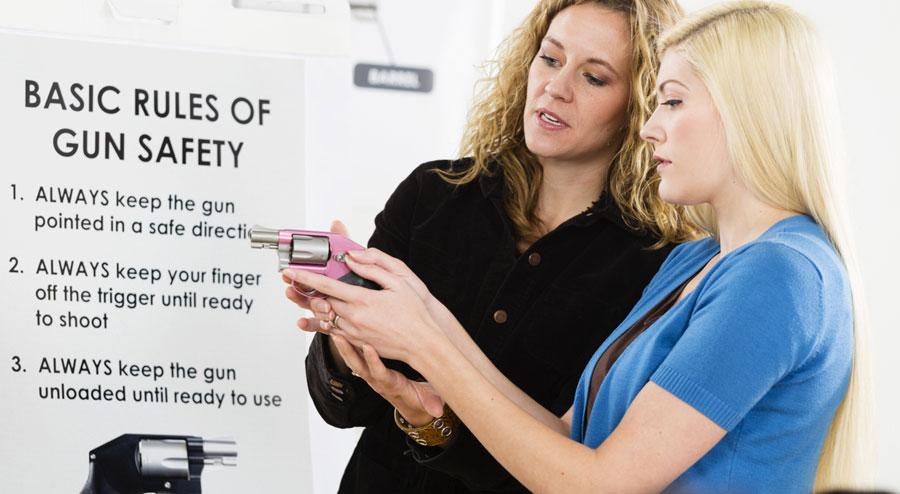Most people probably assume that Texas has some of the laxest gun laws in the country but, depending on what data you look at, it’s actually somewhere in the middle. Both gun owners and those who advocate restricting access to guns might be surprised at the number of Texas gun laws in place.
If you live in Texas and are planning to purchase a gun or if you’re just traveling for a visit, it’s important to understand the law. Since every state is different, it’s important to take the time to learn about Texas gun laws specifically. Here’s a broad overview.
What Documentation Do I Need to Buy a Gun in Texas?
The Texas penal code doesn’t require a permit to buy a handgun or long arms but there are some age restrictions in place. For one, you have to be at least 18 to possess a firearm in general though there are exceptions for minors who are using guns under adult supervision. You must also be 18 to buy a long arm and 21 to purchase a handgun, subject to a background check.
The penal code doesn’t have an assault weapons law and does not require residents to obtain a license or register their firearms.
What Are the Laws Pertaining to Self-Defense?
Texas has a “stand your ground” law which means that you don’t have to leave premises where you’re legally required to be. The “castle doctrine” also applies in Texas, meaning you’re permitted to use deadly force (i.e. weapons) is permitted to protect yourself against someone trying to enter your home forcefully or unlawfully.
What Are the Laws for Open and Concealed Carry?
Open carry of handguns is generally prohibited, though you can strap on a sidearm if you’re hunting. Long arms can be carried openly in most instances but are somewhat limited. Disorderly conduct statutes prevent you from carrying a rifle into the grocery store or shopping mall and you can’t brandish a shotgun in a crowded parking lot.
Texans can carry a concealed weapon as long as they have the right license to carry. There are some exceptions as to where concealed carry is permitted. For example, firearms generally aren’t allowed in public offices and local governments can impose their own restrictions. It’s always a good idea to check with local law enforcement for specifics.
How to Obtain a Concealed Hand Gun Permit in Texas
You must be 21 or older to apply for a concealed carry permit in Texas. The only exception is for active armed service members who only have to be 18. You’re not allowed to have a concealed weapon if you’ve been convicted of a felony or a Class A or B misdemeanor or have any criminal charges pending and anyone with a restraining order against them is also ineligible.
Having two chemical or alcohol dependency-related convictions within a 10-year period disqualifies you as do certain psychological conditions. You must also be up to date on any child support, taxes, or government fees to be considered.
Firearms Training Requirements

Anyone who wants an open carry license has to take a course taught by a licensed instructor and approved by the state. This involves four to six hours of classroom or online instruction covering a wide range of topics, including:
- Laws pertaining to the use of deadly force
- Handgun safety, including appropriate use of holsters and keeping openly, carried handguns safe and secure
- How to resolve disputes without using violence
- Proper storage to prevent the possibility of accidental injury, especially as it relates to children
In addition to the course, there’s also a written or online exam testing the concepts listed above as well as general safety procedures.
Finally, there’s a demonstration at a shooting range where the applicant has to show safe and proficient use of a handgun. It also involves a shooting test of 50 rounds fired at three, seven, and fifteen yards.
Are There Restrictions to Open Carry in Texas?
Yes. Even if you have a permit, there are certain places where firearms are not permitted. These include:
- Any property owned by the federal government, including post offices
- Courts of any level, including federal, state, and local with some exceptions for guards, judges, bailiffs, and attorneys
- Polling locations on the day of an election, even if you would otherwise be permitted
- Educational institutions of any grade level, whether private or public
- Jails, prisons, or other correctional facilities
- Locations with a 30.06 sign publicly posted indicating that the owner of the property can prevent you from entering if you are armed
- Anywhere that posts a 51% sign which indicates that the business makes more than half of their revenue from the sales of alcoholic beverages
- Public sporting events of any level unless the sport requires the use of a firearm
- Racetracks of any kind
There are other restrictions, too. State law prohibits anyone from carrying a firearm while intoxicated. You’re also forbidden to carry a gun when under the influence of certain drugs, including all illegal substances as well as certain prescription medications that could cloud your judgment.
Property owners also have the right to remove anyone who is armed from their property even if the person has a concealed carry permit.
Reciprocity
Concealed carry reciprocity is when one state recognizes the laws of another. For example, if you’re traveling through Texas with a concealed carry permit from another state, reciprocity would allow you to carry a concealed weapon over the state line and throughout Texas.
Texas has concealed carry reciprocity with 44 other states, including several that are geographically close like Louisiana, Oklahoma, and New Mexico. It’s important to note that reciprocity doesn’t necessarily go both ways. That is, just because Texas recognizes a concealed carry permit from one state doesn’t mean that state also has reciprocity with Texas.
Be Smart, Be Safe
Responsible gun owners are aware of the gun laws in their own state but things can get a little difficult when traveling or relocating to another state. If you’re planning to move to Texas or just passing through, it’s important to know the law and how it applies to you.
